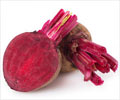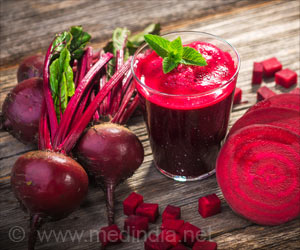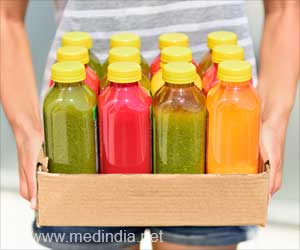Beetroot juice increases exercise duration, power and the ability to breathe in more oxygen during a workout and can help heart failure patients to exercise without fatigue.
Highlights
- Dietary nitrate in the form of beetroot juice supplements improves the exercise capacity of patients with heart failure.
- Acute dietary nitrate intake increased oxygen //uptake and reduced fatigue in patients with heart failure.
- During exercise, the heart finds it difficult to pump more blood and so the oxygen uptake is less in those with heart failure.
Why Can’t Heart Failure patients Exercise?
Patients with heart failure, atleast a half of them have a low ejection fraction or the ability of the heart to pump blood. Because of their condition, these patients find it difficult to breathe, have very low oxygen intake and use more energy while exercising than others. Due to this extra strain, many forgo exercise from their daily routine. To find a solution that can help people exercise, scientists introduced dietary supplements of nitrate in the form of beetroot juice and tested the outcome.Beetroot Juice to Exercise Better
The results showed that the beetroot supplement resulted in significant increases in exercise duration, peak power, and peak oxygen uptake while exercising.Those improvements were not accompanied by any changes in the breathing responses of the patients, and there was no change in their exercise efficiency, a measure of how much external work a person gets for a certain input of energy.
"Abnormalities in aerobic exercise responses play a major role in the disability, loss of independence and reduced quality of life that accompany heart failure," said Andrew Coggan, an associate professor in the Department of Kinesiology in the School of Physical Education and Tourism Management at IUPUI and one of the researchers who conducted the study.
"Perhaps, more importantly, elevations in ventilatory demand and decreases in peak oxygen uptake are highly predictive of mortality in patients with heart failure."
A second important aspect of the study is there were no untoward side effects from the dietary nitrate, Coggan said: "In this case, lack of any significant changes is good news."
Multi-center trials are needed to confirm the proof-of-concept findings and to determine whether longer-term dietary nitrate treatment improves physical activity levels, quality of life and perhaps even survival in patients with heart failure with reduced ejection fraction.
- Coggan AR, Broadstreet SR, Mahmood K, Mikhalkova D, Madigan M, Bole I, Park S, Leibowitz JL, Kadkhodayan A, Thomas DP, Thies D, Peterson LR. ’Dietary Nitrate Increases VO2peak and Performance but Does Not Alter Ventilation or Efficiency in Patients With Heart Failure With Reduced Ejection Fraction.’ Journal of Cardiac Failure (2017).
Source-Medindia















